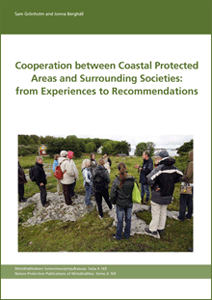Cooperation between coastal protected areas and local societies – from experiences to recommendations
Baltic Sea region’s coastal areas are facing many challenges, such as decrease of local population while tourists, seasonal settlers, and investors are becoming more common. To avoid the coastal nature or local culture being destroyed as a result of these changes, they need to be preserved. Investing resources in national parks and biosphere reserves might be one solution. However, while national parks and biosphere reserves can help sustain livelihoods and maintain local population, this can only be achieved by the different stakeholders working in close cooperation with each other.
Based on this COASTSUST project wanted to know more about the cooperation between national parks/biosphere reserves and their stakeholders. The data for study were gathered during spring 2006 from the Archipelago National Park (Finland), the West Estonian Archipelago Biosphere Reserve, the North Vidzeme Biosphere Reserve (Latvia), and the Curonian Spit National Park (Lithuania). The data were gathered through questionnaires sent to authorities, research institutes, organisations, local inhabitants, entrepreneurs and protected area personnel. The response rate was 46%.
The study revealed that cooperation between the coastal protected areas and their stakeholders mainly concentrates on mandatory issues. Consequently, cooperation involves the protected areas’ personnel, public authorities and research institutes. Voluntary cooperation, such as cooperation between protected areas’ personnel and local people is limited. The main reasons cited for this lack of cooperation are financial and time. There also exists a major information gap between the areas and the local people.
With the exception of the Lithuanian respondents, the stakeholders feel that the cooperation with coastal protected areas has become more extensive and efficient over the last ten years. Also, the majority of authorities, NGOs, educational and research institutes, and local entrepreneurs feel that the current cooperation ‘is special’ and brings additional value. During the last decade, Finnish stakeholders in particular have begun to discover that their cooperation with Archipelago National Park is becoming more and more valuable. In general, there are significant differences in responses between the countries.
The majority of the respondents state that there is a need to improve cooperation – especially communication and disseminating information. Recommendations on how to improve cooperation were made from the researcher’s viewpoint and from the protected areas’ specialists. The researcher argued that in cooperation environmental, social and economic progress need to be considered. Special focus should be on to the two latter, which demand cooperation between protected area personnel and local people. The recommendations by protected areas’ specialists were more concrete.
